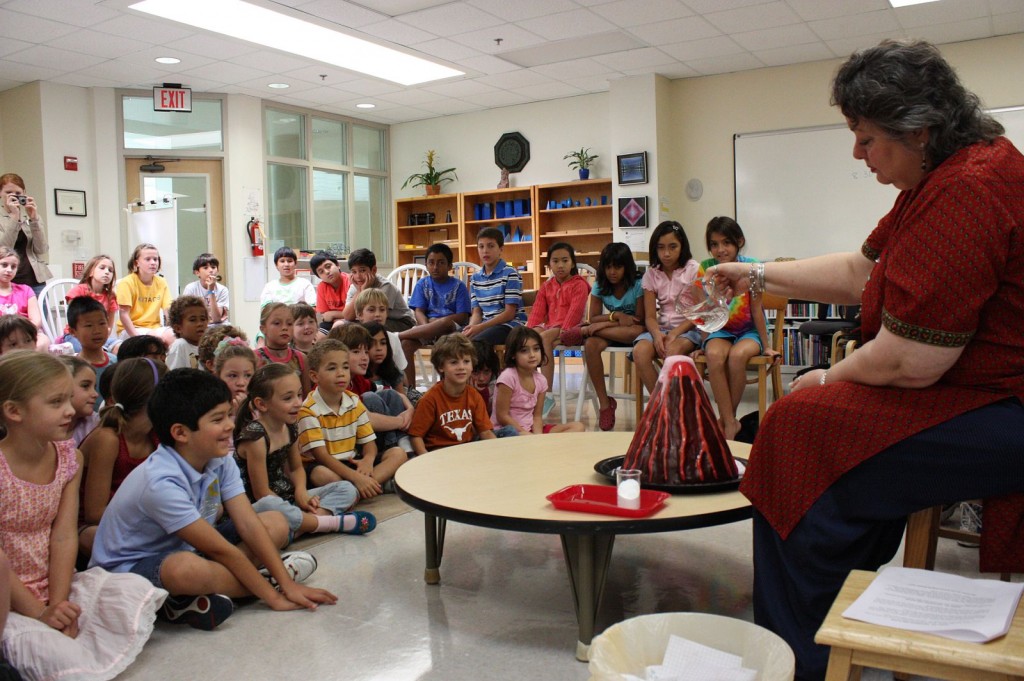
October 29, 2022
“In the beginning, before you were born before your mother and father were born before your grandparents were born before there were even people on the earth before there was an earth! There was nothing…nothing at all.”
The eyes of elementary students grow large as they imagine this, the story of creation, which they hear from their teacher at the beginning of each school year. It is one of five Great Lessons, narratives that weave together the study of all subjects, presenting elementary students with a vision of the universe, and of the interconnectedness of everything, living and non-living, from the cosmos to the span of human culture.
Elementary classes begin with that story each year because it sets the stage for the study of the sun and the earth; day and night, climate and seasons; volcanoes and rocks and minerals; mountains and rivers; plants and animals; trees and flowers, butterflies and bees; of trilobites and crinoids and dinosaurs and saber tooth tigers; of Australopithecus, Neanderthal, and cro-magnon man; of Sumerians, Egyptians, and ancient Greeks; of geometry, arithmetic, grammar, and literature.
This is the academic side of their work, what parents think of when they ask about “curriculum”. But there is more.
Even as the children hear the story of creation, practice cursive handwriting, and work on subtraction problems, each classroom is busy building an intentional community. Teachers sit with children in a circle, an arrangement that enables everyone to see everyone else; a shape that says, “We are all working together here,” and they ask questions such as “What rules do we need?” or “What kind of place do we want our class to be?” Together they develop a list of key rules to govern their class for the year. Not too many; practical and concrete, the rules reflect the character of the elementary child: “Walk in the classroom. Use kind words. Use inside voice.” The children speak of “voice,” and they have a voice in shaping their class community. It belongs to them, and they belong to it. This does not mean there will be no problems. There will be. And the children are empowered to settle many of the problems on their own, sometimes with a simple reference to the rules they have created together, sometimes by bringing an issue to their class meeting, a regular gathering where children express appreciation for one another, and as needed, solve problems that affect the group. Children learn to work together cooperatively and to solve social problems constructively. This is how they develop emotional intelligence and social skills.
Even singing reinforces the work of beginning the school year, for Dr. Montessori understood the power of learning through different media and modalities. Montessori education is not two-dimensional. It is more than books and paper. “At the beginning is a good place to be. What will each day bring for you and me? New life, new friends, new things to do…At the beginning is a good place to be.”
Yes, it is. Beginnings are full of wonder…and more. The children are anxious at the beginning, anxious in both senses: full of eagerness, and perhaps a bit fearful, too, for children live to change each and every day, and they inhabit the steep part of the learning curve.
We create for them at each age learning environments where they feel welcome, where they are known, where they are respected, where they can be fully engaged by work that calls out to them, where they can challenge themselves, and where it is safe to make errors while learning, where they can be themselves, where they are valued for who they are, where they can get help when they need help from their teachers or from their peers, where they can offer to give help when they are able.
At last night’s orientation for middle school parents, the mother of a new 7th grader turned to me and asked, “Could I be a student here?” Parents ask me that question every year. Too few of us attended schools that felt right. Many of us would love the opportunity to do school again. Instead, you are giving your children an extraordinary opportunity. Welcome to the beginning.